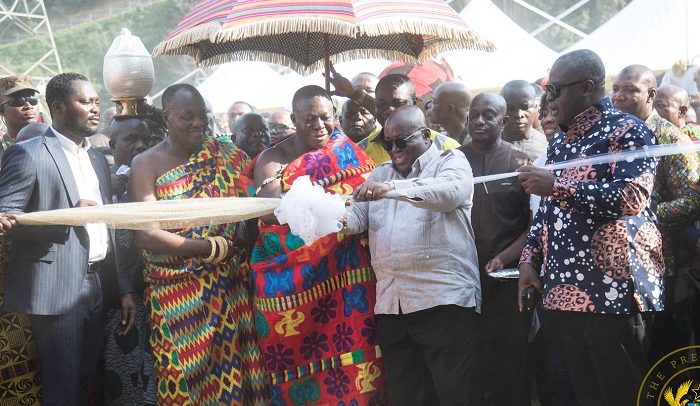President Akufo-Addo being assisted by Otumfuo Osei Tutu II to open the Obuasi Mine yesterday
President Akufo-Addo yesterday launched AngloGold Ashanti’s Obuasi Mine Redevelopment Project with a call on management to help transform Obuasi and bring it at par with well developed mining communities in other parts of the world.
According to him, more could be done to transform mining communities if government and mining companies collaborate in an intelligent and sustainable manner.
The launch of the mine’s redevelopment project was in fulfillment of a campaign pledge to the people of Obuasi on 15th July, 2016 by then candidate Nana Akufo-Addo in the run-up to the 2016 general elections. Obuasi Mine has remained closed since 2014.
“In order to help Anglogold Ashanti secure the needed investment for this project, government had to provide a number of fiscal incentives and guarantee the stability of the project against changes in the legal environment, especially in the early years of the mine’s operations,” he said.
The President continued: “It is expected that all the agreements reached, including the vigorous implementation of domestic content policy, will be scrupulously honoured and performed. The initial investment in the redevelopment project is $881 million, with a total investment of $1.6 billion projected for the entire 22-year life of the mine. The whole investment package has been approved by Parliament.”
However, President Akufo-Addo said the distressed state of the Obuasi town was a disgrace that all actors and stakeholders must work to change, adding that the time has come for Obuasi to be the richest gold mine in the country and the world at large.
He disclosed that the new mine is expected to create 2,500 jobs to bring back life again to the once vibrant town, insisting that he personally expects an improvement in the circumstances.
“Additionally, government is expected to rake in some $2.16 billion in revenue over the next 22 years in royalties, corporate and withholding tax,” he added.
He commended the Deputy Minister of Finance, Kwaku Kwarteng and the Asantehene Otumfuo Osei Tutu II for the pivotal roles they played in the launch of the project.
He assured management and staff of the mine that the sequence of events that led to the closure of the mine would not reoccur under his leadership.
The President said that the days of forceful encroachment on the concession of the company as witnessed between 2010 and 2016 were over.
“Under this government, the rule of law works and the company cannot fold. I am fully persuaded that all stakeholders, particularly residents of Obuasi, have learnt the lessons of recent unfortunate past,” the President said.
The implementation of the Obuasi redevelopment project was undertaken in two distinct phases with the first phase comprising project establishment, mine rehabilitation and development, as well as plant and infrastructure refurbishment.
Executive Vice President of AGA, Graham Ehm, said this would enable production at a rate of 2,000 per day for the first operating year and that this is expected to take approximately 18 months, with the first gold pour expected this year.
According to him, the phase two would include refurbishment of the underground materials of handling system, shafts and ventilation, as well as construction of the primary crusher, SAG/ball circuit, carbon regeneration, a new gold room and tailings facility.
“This is expected to take a further 12 months and enable the operation to climb to 4,000 per day. The operation is expected to ramp up to 5,000 per day over the following three years,” he disclosed.
Mr. Ehm stated that mine production in the first 10 years would focus on the upper ore-bodies which are expected to average 350,000 ounces to 450,000 ounces annually at an average head grade 8.1gramme per tonne.
AngloGold Ashanti’s Obuasi Mine was shut down for upgrading as a result of a number of operational challenges that bedeviled the mine.
The gold mine was said to be operating behind development which meant that there were no new stopes (new areas) to mine underground.
The mine was also operating with obsolete equipment, poor security and inadequate power supply.
Apart from that, about 10,000 illegal miners were undermining production at the mine.
Meanwhile, members of the Ghana Mine Workers Union (GMWU) have welcomed the re-opening of AngloGold Ashanti’s Obuasi Mine, saying it would not only improve the fortunes of the mining sector but create employment for the teeming unemployed youth in the country.
From Ernest Kofi Adu, Obuasi

